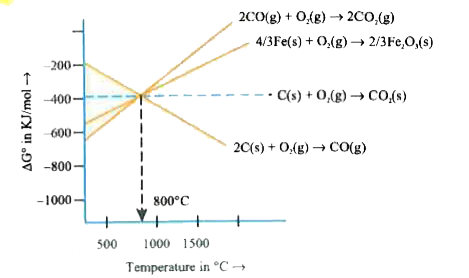Complete Solutions to EXERCISE - 2 (EXTRACTION OF METALS) of chapter METALLURGY of Class 12 book with complete answers and questions
| Class 12 | CHEMISTRY |
| Chapter | METALLURGY |
| NARAYANA | EXERCISE - 2 (EXTRACTION OF METALS) |
| Number Of Questions | 15 |
| Academic Year | 2023-24 |
Which of the following processes involves smelting ?
View SolutionIdentify `X` and `Y` in the following reactions .
`PbS underset("in air") overset (Heat) (rarr) (X)`
`(X) + PbS overset (Y) (rarr) pb+SO_(2)`.
View SolutionHeating mixture of `Cu_(2)O`and `Cu_(2)S` will give
View SolutionExtraction of zinc from zinc blende is achieved by:
View SolutionWhich of the following is correctly matched?
View SolutionHow is cas iron different from pig iron ?
View SolutionCarbon reduction process is used for the extraction of
View SolutionWhen ZnS and PbS minearls are present together, then NaCN is added to separate them in the froth floatation process as a depressant, because :
View SolutionConsider the following reaction at `1000^(@)C`
(A) `Zn (s) + (1)/(2) O_(2) (g) rarr ZnO(s), Delta G^(Ө) = - 360 kJ mol^(-1)`
(B) `C (s) + (1)/(2) O_(2) (g) rarr OO(g), Delta G^(Ө) = - 460 kJ mol^(-1)`
Choose the correct statement at `1000^(@)C`
View SolutionThe smelting of iron in a blast furnace involves, which of the following process(es)?
View SolutionThe maximum temperature `1550^(@)C` is obtained in the _____ region of the blast furnace used in the the extraction of iron.
View SolutionIn the commercial electrochemical process for aluminium extraction, the electrolyte used is
View SolutionWhat is the effect of adding a catalyst on
(a) Activation energy (Ea), and
(b) Gibbs energy (`DeltaG`) of a reaction?
View Solutionनिम्नलिखित में से कोनसा कथन सही है----
View SolutionCorrect statements form the graph

I) Above 1073K, `DeltaG^(0)` for the formation of `Fe_(2)O_(3)` is less negative than `DeltaG^(0)` for the formation of CO from carbon
II) Above 1073K, Carbon can reduce `Fe_(2)O_(3)`
III) Below 1073K, CO can reduce `Fe_(2)O_(3)`
IV) In blast furnace, reduction of `Fe_(2)O_(3)` occurs in different temperature ranges with below 1073K by CO (or) above 1073K by carbon
View Solution
EXERCISE - 2 (EXTRACTION OF METALS) questions and complete solutions for chapter METALLURGY of NARAYANA CHEMISTRY (HINGLISH) of Class 12
All Exercises from NARAYANA Class 12 CHEMISTRY METALLURGY
- C.U.Q
- EVALUATE YOURSELF - 1
- EVALUATE YOURSELF - 2
- EVALUATE YOURSELF - 3
- EXAMPLE
- EXERCISE - 2 (CLASS WORK)
- EXERCISE - 2 (CONCENTRATION OF ORES)
- EXERCISE - 2 (EXTRACTION OF METALS)
- EXERCISE - 2 (REFINING OF METALS AND USES)
- EXERCISE - 4
- EXERCISE - 4 (MATCHING TYPE)
- EXERCISE - II ( CONCENTRATION OFORES)
- EXERCISE - II (EXTRACTION OF METALS)
- EXERCISE - II (HOME WORK)
- EXERCISE - II (REFINING OF METALS AND USES)
- EXERCISE - III
- EXERCISE-1 (CLASS ) (REFINING OF METALS & USES)
- EXERCISE-1 (CLASS WORK) (CONCENTRATION OF ORES)
- EXERCISE-1 (CLASS WORK) (EXTRACTION OF METALS)
- EXERCISE-1 (CLASS WORK) (INTRODUCTION)
- EXERCISE-1 (HOME WORK)(CONCENTRATION OF ORES)
- EXERCISE-1 (HOME WORK)(EXTRACTION OF METALS)
- EXERCISE-1 (HOME WORK)(INTRODUCTION)
- EXERCISE-1 (HOME WORK)(REFINING OF METALS AND USES)
- STATEMENT TYPE QUESTOINS